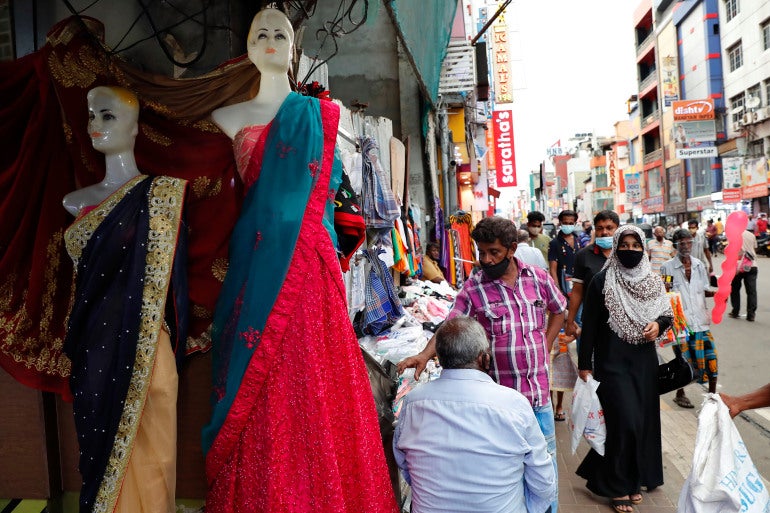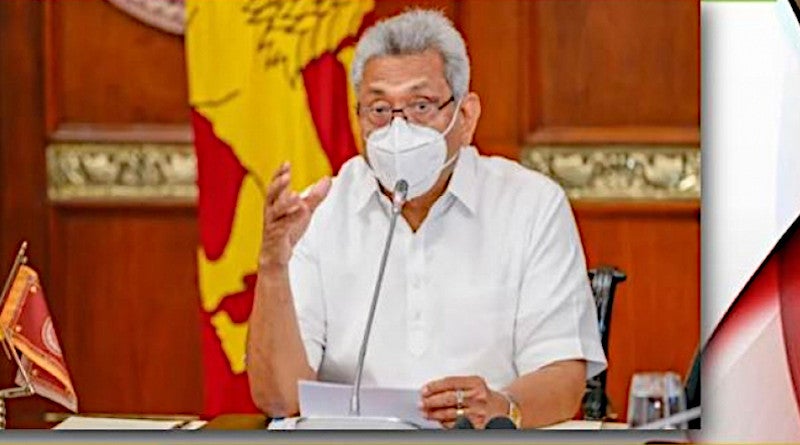Human rights concerns over Sri Lanka’s controversial plans for ‘rehabilitation centres’ for extremists
A plan to use the centres has raised fears they could be used to target the country’s Muslim minority and lead to human rights abuses, reports Lemma Shehadi


Since the Easter Sunday suicide bombings of 2019, which killed 269 people and injured over 500 in churches and hotels, Sri Lankan authorities have sought to combat the threat from violent Islamist groups.
In March the country issued a new regulation, under the country’s hotly debated Prevention of Terrorism Act (PTA), that could send hundreds of the island’s Muslims to rehabilitation centres controlled by the military.
Individuals who are suspected of holding extremist beliefs can be referred to a government-designated rehabilitation centre for up to 12 months, with the possibility of extension.
These referrals can be requested by the Sri Lankan police, intelligence agencies, the Ministry of Defence, or any official appointed by the President, Gotabaya Rajapaksa.
A legal adviser to the Ministry of Defence did not respond to requests for comments.
But critics have warned that the regulation is a misuse of the law, that could end up justifying arbitrary detentions and silence dissent.
“It gives the military, police and any person authorised by the President the power to arrest first and conduct investigations only afterwards. The rehabilitation can be ordered without a trial,” said Ambika Satkunanathan, a human-rights lawyer from Colombo who has petitioned against the new regulation.
“It is part of a continuum of abuse under the PTA, which is a draconian law that does not adhere to international human rights standards ” she added.
Others fear that Sri Lanka’s counterterrorism policies are targeting the country’s Muslim minority in a manner that could resemble China’s treatment of the Uyghurs in Xinjiang. It comes alongside publicised measures to ban the burqa and also close some Islamic schools.
“As with China’s re-education centres, the camps to be established under Sri Lanka’s new regulations would go beyond punishing overt acts and instead proscribe thoughts,” wrote Shreen Abdul Saroor, a women’s rights activist who has also petitioned against the regulation, in the Sri Lanka Brief.
The petitions will be heard by the Supreme Court, which could order the government to scrap the regulation if it finds a constitutional violation.
“We hope the Supreme Court's decision will ensure the protection of human rights,” said Satkunanathan. The regulation must also be presented to parliament for approval.
Yet preparations for rehabilitation are already underway, according to Major General Darshana Hettiarachchi, the Commissioner General for Rehabilitation.
“Things are moving fast,” he told The Independent. A centre in the northern city of Vavuniya, will be part of the new de-radicalisation programme.
“We will provide leadership qualifications, music and drama therapy sessions, yoga and meditation,” he said, “We have developed a comprehensive programme with lectures on how to live a peaceful life in society and with your family, and how to groom your children.”
Islamic scholars have been selected to lecture at the centre.
“These are highly respected independent scholars who are not affiliated to any political party or religious group. They will lecture on the correct ways of the Quran, and put people on the correct path” added Hettiarachchi.
Sri Lanka’s rehabilitation centres were established in 2009 after the end of the country’s 30 year civil war, to rehabilitate members of the Tamil Tigers (LTTE), a separatist militia that fought against the Sri Lankan army.
“During the civil war we dealt with extremist political ideology. But today, we are dealing with religious ideology,” said Hettiarachchi.
But these rehabilitation centres were often accused of human rights abuses.
Over 12,500 people were detained in rehabilitation centres after the civil war, including over 500 children.
“Many displaced people from LTTE-controlled territories were sent to rehabilitation without being tried for any offence” said Satkunanathan, “and many accepted, fearing indefinite incarceration pending charges or lengthy trials.”
Dozens of detainees disappeared from these camps, with reports of surveillance and harassment after their release.
Hettiarachchi, who oversaw the rehabilitation of former combatants from 2012-13, sees things differently: “It was a successful programme which put an end to terrorist attacks by the LTTE,” he said. “Most of them are still in touch with me, we have a very good relationship.”
Of the new de-radicalisation programme, he said: “There will be no torture, no harassment and no ill treatment. It will be done in a pleasant environment. I am sure they will be happy and enjoy it.”
The rehabilitation centres could be used to process the hundreds currently detained under the PTA.
“The police and intelligence services arrested people with different levels of involvement in the Easter bombings. Those who had a marginal or indirect involvement will be sent to the centres to be rehabilitated and reintegrated into society,” said Hettiarachichi, declining to comment on the numbers.
Over 700 people, most of them Muslims, were detained in connection to the bombings. More than 300 remain in detention without charge, sometimes for almost two years, according to activists.
But critics say that police and intelligence services have, in most cases, failed to establish a connection to the attacks. Instead, they add, the PTA has also been used to target government critics and the country’s Muslim minority, who make up around 10 per cent of the 22 million people in Sri Lanka. The largest religious group are Buddhists, who account for 70 per cent.
Hijaaz Hisbollah, a prominent human rights lawyer from Colombo has been detained without charge for over a year. Just weeks before his arrest, he criticised the government’s decision to dissolve parliament.
Another detainee is Ahnaf Jazeem, a young poet and schoolteacher from Mannar, northern Sri Lanka.
One of his poems condemning extremism was mistaken as an incitement to violence by the police. Translations of Jazeem’s poetry have circulated on social media to highlight the non-violent nature of his work. “My brother wrote about peace,” said his brother Afham.
The office of the Chief of National Intelligence has been contacted for comment.

Hettiarachchi acknowledged this risk: “Muslims in Sri Lanka today feel that they are suffering because of the actions of [the Easter Bombing attackers]. The families of suspects are going through a lot of difficulties,” he said. “After rehabilitation, we will ensure their reintegration into society and assist in every possible way.”
Meanwhile, activists say that detainees are being coerced into consenting for their rehabilitation.
“My husband has been asked by the prison authority to sign a consent form for rehabilitation, which he refused to sign,” said the wife of a detainee who spoke on condition of anonymity.
Her husband has been detained for two years under the PTA,on suspicion of connections to a terrorist organisation.
“If the rehabilitation process is the only way to get him out then he may agree to it. Our children need to see their father.”
Join our commenting forum
Join thought-provoking conversations, follow other Independent readers and see their replies
Comments